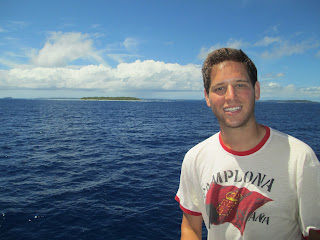After the class 6 exam, which occurs in
mid-October and is extremely important as it decides whether or not the class 6
students graduate and which high school they will attend, nothing much happens.
It is very similar to what happens in America after high schoolers take the AP
exams and then watch movies for a month. The kids sing Christmas songs, play
cards and sports, and, most importantly, practice their cultural dances.
At the end of the school year, every region has
to put on a faiva (which in this case means dance and show, but the term can
also refer to movies, concerts, or other forms of entertainment) for officers
from the ministry of education. It is a pretty big deal and all of the schools
practice for months to make a good impression in front of the ministry.
My school, GPS Houma, is part of the East region
and took part in the faiva with GPS Ha’alaufuli, GPS Tu’anekivale, and GPS
Kaloa. The faiva took place in GPS Ha’alaufuli and was a massive production.
There were gigantic speakers that blasted the music, food for the officers and
teachers, and hundreds of Tongans in attendance – the kids, the teachers, and
many of the parents. As the only palangi (foreigner/white person) in a sea of
Tongans you can imagine how much I stuck out, but everyone was incredibly
welcoming.
Each school chose different dances. The first
school, GPS Kaloa, performed the traditional Tongan dance, the tau’olunga,
which is usually only danced by virgin, or unmarried, girls, but in this case
was performed with an interesting twist. Instead of girls, the dancers were all
boys wearing girl outfits and lime-green colored wigs, as you can see in the
photo below. The Tongans loved it. For many reasons that I do not fully
understand, homosexuality is illegal in Tonga and is not discussed as even a
possibility for Tongans, but cross-dressing in this manner is completely
acceptable and has long been practiced traditionally.
Next came my school, GPS Houma, who I have seen
practice their dance dozens of times but never in their traditional costumes.
They were dancing the kailou, or Tongan war dance, but all the words of the
song were in Fijian, which I found interesting because the title of the faiva
was “Tongan Culture Day,” but oh well. In the pictures below, the class 1 to 3
kids, parents, and teachers sing in the background, and the class 4 to 6
students dance. They were great, and in my highly unbiased opinion, the best of
all the schools.
The last two schools continued to dance the
traditional Tongan dances and were quite good. The last school, GPS
Ha’alaufuli, had students dancing the ma’ulu’ulu in the sitting position, which
you can see in the last photo.
Overall it was a very interesting day and
revealed to me the mixture of tradition and modernity that represents Tonga’s
culture today. I feel that with each day I am continually learning and
understanding a little more of a culture that I had never even heard of just a
few months ago. It has really been a fascinating experience for me so far.
As for me, I celebrated a very nice first
birthday in Tonga yesterday. After school, my principle drove me into town, and
I had a great dinner – a much needed burger and fries!- with some of the other
pcvs and had a few beers during trivia night at Tonga Bob’s. I even convinced the
group to go for a midnight swim in the harbor afterwards, my first time in
waters of Vava’u, which was a lot of fun.
It was low-key and exactly what I wanted. I felt
very lucky that even with my friends and family so far away, the other
volunteers made me feel as if I was home.
Thank you everyone for the birthday wishes I have
received from many of you through email and facebook – you’re support has made
this transition much easier for me.
Some of my Class 6 and 5 students in their traditional costume
The boys from GPS Kaloa wearing women's clothing and wigs, while dancing the tau’olunga.
My students dancing the kailou
Also my students. The man in the back left wearing a blue shirt and flower necklace (kahoa) is my principle Sione. The women in red is the Class 1 & 2 teacher, Fei'ofa'aki, and the man in the blue shirt and sun glasses is Paea, the Class 3 & 4 teacher.
The students of GPS Ha’alaufuli dancing the ma’ulu’ulu. The man in the red shirt wearing the flower necklace is their principle and he is playing the drums on the top of a garbage can.







































